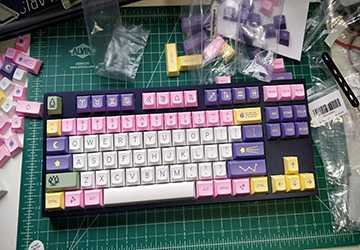Who Needs a Mechanical Keyboard and Why?
Who needs a mechanical keyboard, and why?
In personal computing, the keyboard may seem insignificant compared to high-end processors and ultra-fast SSDs. However, its importance increases dramatically when you consider that the keyboard is the primary interface to your computer. Mechanical keyboards are extremely popular, especially in circles where typing is a daily routine and an essential job function or competitive advantage. So, let's break down the benefits of mechanical keyboards, determine who uses mechanical keyboards, and delve into the nuances of automatic and membrane keyboards.

Auditory and tactile feedback: a symphony of productivity
One of the most well-known benefits of mechanical keyboards is their tactile and audible feedback. Each key press produces a satisfying click, which many users find enjoyable and helps provide a more precise and faster typing experience. This tactile feedback can increase productivity and job satisfaction for professionals such as programmers, writers, and data entry experts.
Rugged longevity: a long-term commitment
Another attractive advantage of mechanical keyboards is their longevity. Equipped with a different automatic switch for each key, these keyboards can withstand tens of millions of keystrokes and perform many times better than comparable membrane keyboards. For those who spend a lot of time at their computers (gamers, programmers, writers), its long lifespan justifies the initial cost and makes it a good investment in the long run.
Personalization scope: perfect customization
All mechanical keyboard users have one thing in common: their need for customization. With the variety of tactile and volume switches available on mechanical keyboards, users can choose the ideal controller based on their typing tendencies and style. Additionally, the keycaps are easily replaceable, giving membrane keyboards an ergonomic and aesthetic versatility they often lack. This level of personalization appeals to a diverse audience, from artists and designers to hardcore gamers, making mechanical keyboards extremely versatile.
Mechanical Keyboards vs. Membrane Keyboards: The Battle for Precision
To better understand the advantages of mechanical keyboards, it's essential to compare them to membrane keyboards. Membrane keyboards are generally cheaper and quieter but lack the tactile feedback that mechanical keyboards provide. They are generally less durable and offer fewer customization options. Therefore, people who need the best performance from their keyboard over an extended period (such as professional gamers, writers, and programmers) often choose mechanical keyboards over membrane keyboards.
Who uses mechanical keyboards: a broad target group with specific needs
So, who uses a mechanical keyboard? The answer is entirely different. Gamers love the fast operation and anti-ghosting features. The authors and programmers value tactile feedback and durability. Artists and designers love the customization options, while office workers find the ergonomic advantages invaluable for long periods of typing. Mechanical keyboards have managed to carve out a niche in various segments of the professional and hobby markets and are, therefore, more than just a niche product.
Beyond the Basics: Discover the Hidden Potential of Mechanical Keyboards
In the previous discussion, we examined the mainstream benefits of mechanical keyboards and identified the main user groups that comprise the categories of users who use mechanical keyboards. Now, look deeper into less traditional but exciting features and benefits that make mechanical keyboards stand out in the automatic vs. membrane keyboard debate.

Programmable Buttons: A Game Changer for Efficiency
In addition to the feel and sound that mechanical keyboards are known for, many models offer fully programmable keys. This feature is a shortcut gateway for software developers, video editors, and gamers, allowing quick access to complex command sequences. For those looking to streamline their workflow, this often-overlooked feature makes mechanical keyboards stand out on the list of automatic keyboard pros.
RGB lighting: not just for show
Customizable RGB lighting in automatic models is an aesthetic benefit when considering mechanical or membrane keyboards. However, this lighting can be used for practical purposes. For example, buttons can be color-coded to assign them to different functions, aiding muscle memory and improving usability. This means the keyboard is not only visually appealing but also functionally efficient.
Anti-ghosting and N-key collision-free: advantages for competitive gaming
The competitive gaming community is an integral part of the game for anyone who wants to know who uses a mechanical keyboard. One of the most underrated advantages of mechanical keyboards in this area is anti-ghosting and N-key rollover. This ensures that "ghost" keystrokes are not sent when multiple keys are pressed simultaneously, and each keystroke is recorded individually. This precision often makes the difference between winning and losing in high-stakes gaming scenarios.
Portability and modular design: travel with freedom
Portability is another aspect to consider when discussing mechanical keyboards vs. membrane keyboards. High-quality mechanical keyboards often come with detachable cables and modular designs, making them easy to pack up and take. This feature appeals to digital nomads and frequent travelers who want to maintain their typing experience outside their primary workplace.
Advanced software integration: more than just typing
When we looked more closely at who uses mechanical keyboards, we found that power users benefit from the built-in software features of some high-end automatic models. These range from creating macro commands to detailed performance analysis, allowing users to customize their experience at a specific level to an unprecedented degree.
Finally, mechanical keyboards have many advantages that make them attractive to users. Mechanical keyboards offer many advantages, from unique tactile feedback and listening pleasure to solid construction and high levels of customization. When you compare them to membrane keyboards, the choice becomes clear for those who rely heavily on their keyboards for professional or competitive purposes. Mechanical keyboards are used by a wide range of users, covering almost all types.
Related Posts
- Top 10 Cloud Security Solutions for Data Protection
- How to Conduct Ethical Hacking: Penetration Testing Essentials
- 6 Tips for Choosing the effective Graphics Card for Gaming
- USB-C: The Future of Connectivity
- When is the Best Time to Buy Electronics?
- 4 Most Important Gadgets for Remote Work to Boost Productivity in 2023